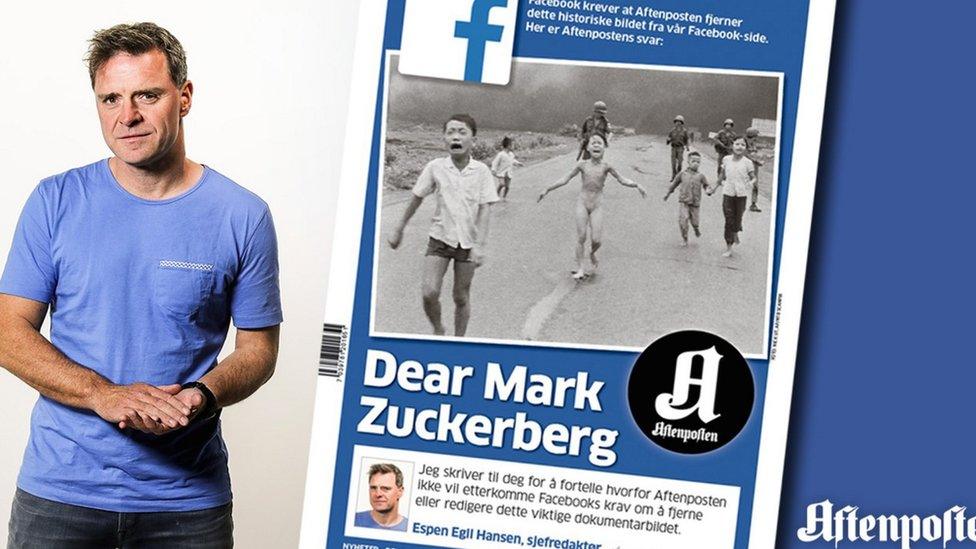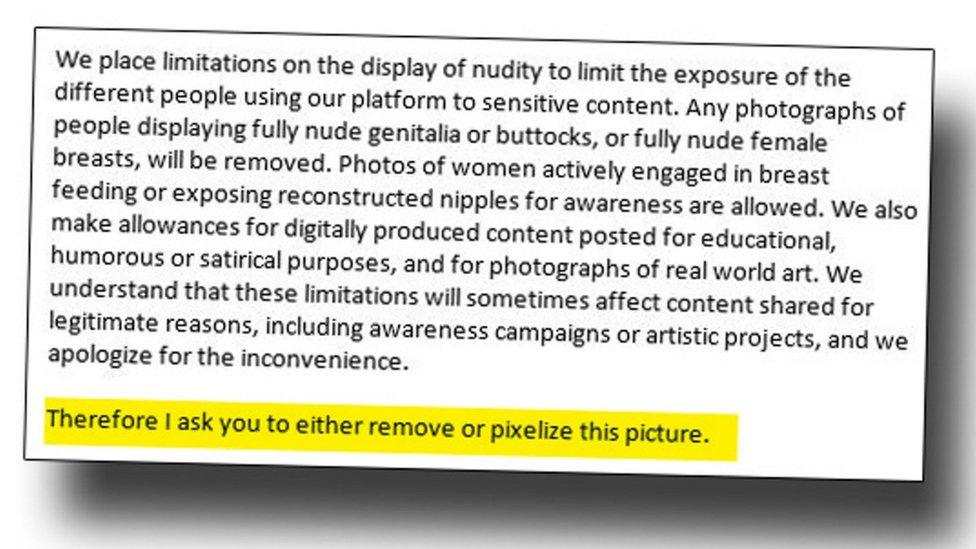Fury over Facebook 'Napalm girl' censorship
- Published
- comments

Espen Egil Hansen is editor of Aftenposten, Norway's largest newspaper.
Facebook has controversially removed the iconic image of a girl fleeing a Napalm attack during the Vietnam war from a post, on the grounds of nudity.
The editor of Norwegian newspaper Aftenposten said the entire post, which was about iconic war imagery, was later deleted and the account of the reporter behind it suspended.
Espen Egil Hansen has accused Mark Zuckerberg of "an abuse of power".
Facebook said it has to restrict nudity for cultural reasons.
Mr Hansen said the image of Kim Phuc, then aged nine, was removed less than 24 hours after the newspaper received a request from the firm to either take down the image or pixelate it and before it had responded.
"While we recognise that this photo is iconic, it's difficult to create a distinction between allowing a photograph of a nude child in one instance and not others," Facebook said in a statement.
"We try to find the right balance between enabling people to express themselves while maintaining a safe and respectful experience for our global community. Our solutions won't always be perfect, but we will continue to try to improve our policies and the ways in which we apply them."
Several Norwegian politicians, including Prime Minister Erna Solberg, also shared the image but within hours it had been removed again, Aftenposten reports, external.

The message sent by Facebook to Aftenposten.
'Promoting stupidity'
He described Mr Zuckerberg as "the world's most powerful editor" but added that he was restricting Aftenposten's own editorial responsibilities.
"I am worried that the world's most important medium is limiting freedom instead of trying to extend it and that this occasionally happens in an authoritarian way," he wrote.
The letter goes on to state: "If you will not distinguish between child pornography and documentary photographs from a war, this will simply promote stupidity and fail to bring human beings closer to each other.

Who is the girl in the photo?
Kim Phuc was nine years old when she was photographed running for her life following a Napalm attack north of Saigon in June 1972.
She suffered horrific burns. Photographer Nick Ut and ITN correspondent Christopher Wain took her to hospital. They were told she was not expected to survive the day.
"There was a blast of heat which felt like someone had opened the door of an oven. Then we saw Kim and the rest of the children. None of them were making any sound at all - until they saw the adults. Then they started to scream," Mr Wain recalled in 2010, external.
After 14 months in hospital and 17 operations, she was able to go home.
Today Kim Phuc is 53 and lives in Toronto with her husband, children and parents. She is still in constant pain from her injuries but says she has found peace.
She said at first she hated the photograph, external but now it informs her work as a UN goodwill ambassador, external and with her Kim Phuc Foundation to support child victims of war.
As a nine-year-old Kim Phuc suffered burns to a third of her body during the Vietnam War

"To pretend that it is possible to create common, global rules for what may and what may not be published, only throws dust into people's eyes."
He ended the letter saying that Facebook had opened up a lot of positive opportunities and he wanted to see them used "in a better way".
Aftenposten is the largest newspaper in circulation in Norway and Rolv Erik Ryssdal, chief executive of its parent firm the Schibsted Media Group, said Facebook's actions were "not acceptable".
"Independent media is the foundation for democracy," he said in a statement., external
"Facebook's censorship is an attack on the freedom of expression - and therefore on democracy."
The social network said it had to have the same rules for everybody.
Editorial responsibilities
Social media consultant Sue Llewellyn said she believed Facebook's actions were heavy-handed.
"I understand what they are saying but I think they are over the top," she said.
"It's ridiculous when everybody knows that image, and it is such an iconic image, to ban it."
She also disagreed with Mark Zuckerberg's comments last month, external that his company is a technology firm, not a media organisation.
"You can't be a distributor of news without having editorial responsibilities," she said. "They can't keep washing their hands of it and then censoring content."
- Published8 September 2016

- Published27 August 2016

- Published9 September 2016
